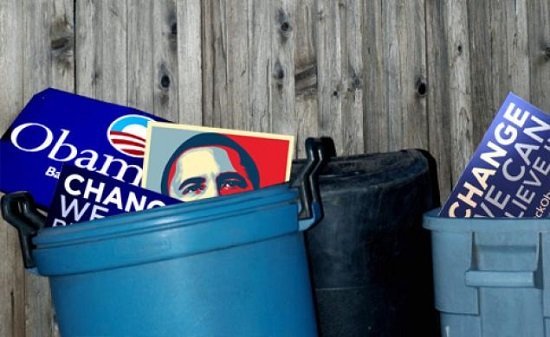
A Youth Misery Index that measures young Americans’ woes has skyrocketed under President Barack Obama and hit an all-time high.
The index, released Wednesday, was calculated by adding youth unemployment and average college loan debt figures with each person’s share of the national debt. While it has steadily grown over the decades, under Obama the figure has shot up dramatically, from 83.5 in 2009 to 98.6 in 2013.
The index has increased by 18.1 percent since Obama took office, the highest increase under any president, making Obama the worst president for youth economic opportunity, according to the nonprofit that released the figure. [Source: thecollegefix.com, 1/9/14]
Would Obama still win the youth vote in another election held today? There’s little question.
Will Obama’s successor, most likely Hillary Clinton, win the youth vote in the next presidential election? There’s little question.
It’s tempting to conclude that because the vast majority of youth voted for Obama, the vast majority deserve what they got.
True enough, but this assumes two things:
One, that the Republicans offered a genuine alternative. Nothing in Mitt Romney’s record suggested he was all that different from Obama. It was his own Massachusetts health care plan that served as the model for Obamacare. He defends it to this day by claiming that socialized medicine is justified on the state level, but not on the national level. In other words: Individual doctors and patients have rights when confronted with the federal government, but their state government may do whatever it pleases to them. Romney also agrees with Obama on environmentalism. As for John McCain, it was never even all that clear that he was a Republican.
Little would have been different under a McCain or Romney presidency. However, that’s still no excuse for endorsing Obama, and giving an uncritical, unapologetic “thumbs up” to the decisive decline of individual rights in America.
Two, we’re assuming that young people consider factors measured by the “misery index” the most important things. I’m sure some young people do consider college loan debt and unemployment paramount items of concern. But not all young people are concerned about college loans, because not all young people go to college (or pay for it themselves). And not all young people necessarily wish to work. I base this on the comments of hundreds of parents I talk to (or hear from) every year whose twenty-something kids live at home with them, and are not seeking work. I base this also on figures showing that more grown children are living at home into their 20s and 30s than at any time since the 1930s. While some of these young people would certainly rather not be living at home, some of the ones I have met and talked with don’t really think it’s that bad a deal.
My point is: You cannot interpret numbers based on assumptions which may, or may not, be true.
What these figures do tell us is that Obama’s policies have not contributed to a growing economy. In fact, his policies have further impeded such growth.
Young people are among the first hit – and hardest hit – by bad economic policies. Middle-aged and older people have had more time to benefit from periods when the economy was relatively better.
Think about it. If you’re 40 or 50, you’ve known relatively better economic times such as the 1980s and the latter part of the 1990s. If you’re 20 or 25, you’ve only lived during the lackluster (or worse) George W. Bush-Obama years. And nobody is offering anything better, looking ahead.
Plus: None of us, of any age, has lived under a totally free market economy, where continued prosperity and growth would be the norm. All we’ve known is the boom-and-bust of the government-managed economy (dating back to FDR, or earlier, i.e., Woodrow Wilson with the establishment of the Federal Reserve). Younger people have known nothing but perpetual bust.
Obama continues to blame the housing collapse of 2007-08 for the failure of the economy to rebound in a significant way. But if higher taxation and unprecedented government spending were the solution, wouldn’t we be a lot better off by now than we are?
And wouldn’t young people be among the first to experience it, given their flexibility, resilience and openness to take advantage of new opportunities?
It will take a trillion years to pay off the debt we’ve already piled up under Obama, more than almost all other presidencies combined. Today’s young people will be the ones expected to pay off the debt — or deal with the consequences of refusing.
For the sake of young people most of all, I hope to live and see the day when we have a second political party in the United States—one whose economic policies will be radically opposite of Obama’s. Then perhaps all of us will have a chance; young people, most of all.
Be sure to “friend” Dr. Hurd on Facebook. Search under “Michael Hurd” (Rehoboth Beach DE). Get up-to-the-minute postings, recommended articles and links, and engage in back-and-forth discussion with Dr. Hurd on topics of interest.
